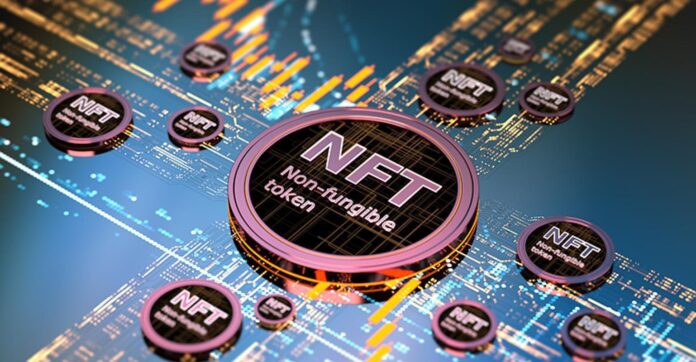
You’ve seen the digital art renderings of monkeys selling for thousands or even millions of dollars. You might have heard about McDonald’s and Panera, among other major hospitality and retail brands, filing for trademarks within the metaverse. And recently, NFT-based restaurant experiences have been creeping into the industry lexicon, from NFT food halls and exclusive membership-only restaurants to one brand, Chick’nCone allowing investors to use NFTs to buy share in brand franchise fees and royalties.
But what exactly is the metaverse? And are NFTs just a fad, or should restaurant operators invest in it as the “next big thing” for the industry?
Nation’s Restaurant News spoke with Michael Kondoudis, a Washington, D.C.-based attorney specializing in federal trademarks and patents about the basics of NFTs, crypto, the metaverse, and why the restaurant industry should sit up and pay attention.
How would you describe NFTs from a layman’s perspective?
NFT stands for non-fungible token. They are digital tokens. When something is fungible, it’s easily replaced with something of the same quality or value. A non-fungible token is unique. And this technology has been developed to protect crypto– that’s where this blockchain technology comes from. The blockchain protects you from having someone go in and copy a bitcoin and saying ‘well, now I have two bitcoins.’ The blockchain keeps it unique and non-fungible. […] NFTs lock up and make sure that the token is unique, so that the crypto asset, or sometimes even a real world asset, is owned by one unique person. That’s what an NFT does.
How do NFTs differ from cryptocurrency?
Cryptocurrency is going to be the primary digital currency within the metaverse. Whether it will be Bitcoin or another crypto or state-backed currency remains to be seen. But in a lot of ways, it’s like a credit card transaction on steroids. That’s what it will be like. And so, again, the NF T’s are blockchain protected from copying unique digital assets. That’s where the linchpin is between an NFTs, crypto and the metaverse—that’s where everybody is filing their trademark applications.
Why are NFTs controversial?
They are controversial because they are not as environmentally friendly as people like to think they are. When you’re mining blockchain, we’re talking about running through those NFTs using blockchain technology to track the unique ownership: the code that goes with all of these tokens. Somebody has to keep track of the ownership and then the transfer from one person to another [and those end up getting mined from] these huge, anonymous servers.
Can you explain what the metaverse is? And do you need a VR headset to experience it?
Right now, the metaverse is being driven by the gaming world: Unity, Roblox and all of these open-world gaming systems, which allow for the most advertising and product placement. Many of them are currently being played without virtual reality headsets. We are at a point where the technology does not allow us to realize what we can conceive as the metaverse, and even a VR headset doesn’t make it feel real yet.
[Currently], the experience is somewhat limited (it looks like a game). Facebook envisions the use of VR headsets and AR glasses to get a more “immersive” feel and that is coming in the near future.
So, we haven’t actually experienced the metaverse?
The metaverse will eventually be a nicer, cleaner, brighter, more fun version of The Matrix. […] That’s the goal. And that will happen eventually: it might be five years, or it might be 10 years, but it will happen, because the gamers want it, and everybody else is going to come along for the ride. So, for now, to get anywhere near an immersive online experience, you do need a headset.
Why should a restaurant operator care about all of this?
The first reason they should care is that the big, famous brands are interested and even a small restaurant should wonder why McDonald’s is filing trademarks for NFTs. […] Even famous brands have come to realize that their brands are not 100% protected, and they are exposed to trademark infringement that they can’t stop [within the metaverse]. They’re trying to remedy this weakness in their brand protection because the technology got a little bit ahead of the law.
So, if some guy gets the bright idea of entering the metaverse and selling code that when rendered makes it look like your avatar is wearing Nike shoes, are they really infringing the trademark registration that Nike holds? It’s code, not shoes. […] So, what did Nike do? […] They realized that the most cost-effective way to fill this gap in their protection was to file trademark applications.
Is that what McDonald’s is doing?
McDonald’s has taken a similar approach, but it’s a little different because they’re in restaurant services. They know the metaverse […] is a few years in the future, but they didn’t want a trademark infringement problem, so they did that now. […] The next reason that they decided to do this, I believe, is cross promotion. Their exposure or footprint in the metaverse will almost certainly carry over into the real world.
There will be places where they can advertise in the metaverse, and it will be as effective as advertising in the real world, maybe even more so because it might be less expensive since everything is done digitally. […] McDonald’s also filed trademarks for McDelivery and McCafe, which is open for several business services including virtual concerts and online events where you pay with crypto to get NFT-backed tickets.
They’ve even applied for a virtual restaurant featuring home delivery. In other words, you can order your food in the metaverse and they’ll deliver it to you in the real world.
What about restaurants with less brand recognition than McDonald’s?
The next reason restaurants should pay attention is revenue. Not every restaurant has enough enough recognition or cachet to be able to sell branded virtual goods […] But virtual restaurants are also serving as meetup places. A coffee shop could have a place within the metaverse where they could sell advertising for other businesses, Coke might pay them to offer co-branded products in their virtual restaurant NFT. But the last one, and the one that really matters is, well, there’s two reasons, two final reasons.
It will take time to figure this all out, but it never hurts to dip a toe into it and start early, which is what all of these major brands are doing.
The other thing they’re doing is protecting their brand from harm. Let’s say someone other than Panda Express opens up a Panda Express in the metaverse and they’re selling virtual food, and get the idea to have virtual fortune cookies with racy fortunes written on them? How do you stop them? It’s code, it’d not real.
Everyone wants to get a foothold in the metaverse so they have a chance to fight back in case anything happens.
How do the trademarks for NFTs within the metaverse work?
It takes about 12 months at a minimum to get a trademark through the Patent and Trademark office. Also, these companies are their filing these trademarks based on their intent to offer virtual services in the future. You can buy extensions of time after your trademark is allowed for up to three years. So, these companies have four years to start using their trademarked brand within the metaverse.
[…] My prediction is within the year, you’re going to see virtually every major brand filing for metaverse protections. They don’t want to be left behind. The cost for a new trademark application is a few thousand dollars. […] But if, heaven forbid, you had to fight a lawsuit or fight a proceeding at the patent trademark office, you’re talking tens of thousands of dollars: it’s an ounce of prevention vs. a pound of cure.
So, if I’m a restaurant operator with a few locations, will I want to create an NFT program?
I’m not even sure that NFT’s are in their future. For most operations, you’re going to want to have a metaverse presence. You’re going to want to offer virtual goods and services, or at least meetups and virtual ordering/online delivery. Without a presence, it’s very hard to fight back against even an innocent trademark infringer. […] Let’s say, you have a competitor in your city who opens a similar similarly named restaurant. But now, what if that same thing happens in the metaverse, how do you reach them? Where are they even located? […] If you give [the metaverse host] your trademark registration number, and you say, ‘this other entity is infringing this trademark,’ they will step in and stop it.
Also, you’re going to want some exposure because it’s going to be inexpensive because it’s digital […] And exposure in the metaverse can clearly translate into traffic in the real world.
But if my restaurant already has virtual restaurants, why should I also have a presence in the metaverse?
There will always be a need for real world restaurants, but there are tremendous opportunities in the metaverse, like cross-promotion and brand insurance. […] Remember when businesspeople did not want to have websites? And now, if you don’t have one, people are suspicious. […] Right now, the metaverse is the Wild West, but soon it will be settled, and it will be the logical place where you’ll want to advertise now like on Facebook or Google ads. […] You have to be forward thinking and realize that there’s a reason why the competition is doing this.
Do you think restaurants will get more out of just being a part of the metaverse rather than selling or trading in NFTs?
I’m seeing a lot of brands file applications for NFTs and for cryptocurrency exchanges and marketplaces, where you can transfer cryptocurrencies and NFTs. And there’s no way in the world they’re ever going to do that.
When it comes to restaurants, I don’t think restaurants are going to be trading in NFTs: I think their focus is going to be on virtual goods and services. […] Sometimes, when I’m talking to a client, explain, they want to go for the home run, but if you really push the boundaries, it’s harder to get the trademark registration. [..] So McDonald’s did not file an application for NFTs.
Don’t get bogged down in these cryptocurrency/NFT details: focus on the virtual products and services. The opportunities for cross promotion through meetup spaces like a virtual coffeehouses are abundant.



































